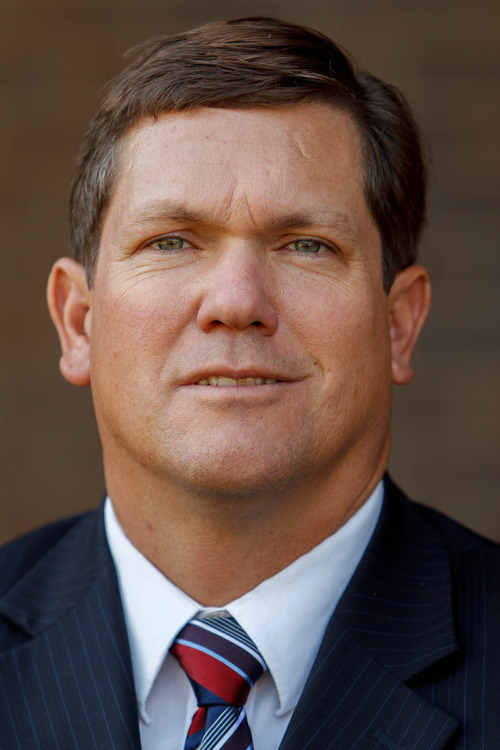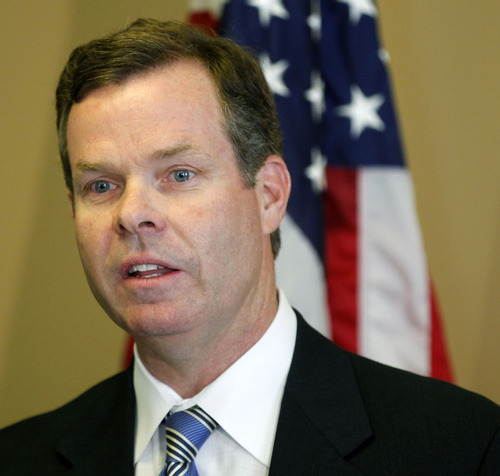This is an archived article that was published on sltrib.com in 2012, and information in the article may be outdated. It is provided only for personal research purposes and may not be reprinted.
Attorney general candidate Dee Smith at a debate Tuesday blasted payday lenders as "predatory" and took a swipe at lobbyists who helped lawmakers defeat legislation that would've made it a bit easier for borrowers to defend against collection lawsuits.
"We need to do more to protect citizens who are disadvantaged and are struggling to make ends meet," Smith, a Democrat and Weber County Attorney, said. "And I think payday loans take advantage of those citizens."
John Swallow, a Republican, chief deputy attorney general and former lobbyist for the payday lending industry, disagreed. He said the attorney general should only investigate if laws are being broken — otherwise they should be "left alone."
"I believe that individuals have the right to secure credit where it makes sense for them," Swallow said. "People ought to have that privilege to decide whether they want to borrow money on a credit card, they want to borrow money on a car, on a house or borrow money in an unsecured fashion from a regulated payday lender."
The clash — before a crowd of about 120 people at the event sponsored by the Salt Lake Rotary Club — was just the second debate between the candidates.
Smith's dig at payday lending lobbyists referred to a bill sponsored this year by Sen. Ben McAdams, D-Salt Lake City, that would've prevented payday lenders from filing lawsuits against borrowers in distant counties. The bill, SB110, was killed in a committee headed by Sen. John Valentine, R-Provo, and a backer of Swallow.
"These are people who don't often have transportation and they want to make it more difficult for them to have access to our court system," Smith said. "The legislation had good support until the lobbyists came by and killed it. We need to do more to protect citizens who are disadvantaged."
Swallow defended the industry, saying such lenders can only earn interest on the first 10 weeks of the loan and that they are regulated by the Utah Department of Financial Institutions.
"If elected, what I would do is make sure that anybody in business is following the rules and regulations put in place by the policymakers — which is the Legislature," Swallow, a former lawmaker, said.
Swallow was also put on the defensive by questions about campaign fundraising — a prickly area where the he has outraised Smith by an almost 25-to-1 ratio by scooping up $1.2 million.
It's an area Smith has been especially critical of and said collecting so much money creates conflicts of interest.
"This is, in general, a troubling area to me," Smith said. "The Attorney General's Office to me has to be independent."
But Swallow noted Smith didn't have a high-profile primary fight to get to the general election.
"Unlike my opponent, I had to go through a convention cycle, which cost me about $300,000 to get through that," Swallow said. "And then a primary cycle to get the nomination, which cost me about $600,000."
Swallow also said "you have to have integrity to be in office" and that "you're not selling fire insurance when you accept a contribution from someone."
The two also differed on Utah's role in filing lawsuits against the federal government.
Smith said a plan to sue the federal government over control of millions of acres is just a message bill and that even if the state could take over the two-thirds of Utah's land mass that is owned by the federal government, the state would have to absorb the $300 million cost of maintaining that property. Add in costs to fight wildfires and Smith said it would force the state to auction off the areas.
"There is no way to recoup that amount of money as a state without selling those lands and exploiting them to the point where we won't be able to enjoy them," he said. "I don't want to live in a state that's locked up with 'No trespassing' signs everywhere I go."
The attempt to get the land back — and eventually go to court — was passed by the Legislature this year in HB148 and was signed by Gov. Gary Herbert. But legislative attorneys said the law is likely unconstitutional.
Swallow said that he wouldn't file a lawsuit if it had "zero chance of moving the needle on an important policy issue" but said the Attorney General's Office is still reviewing its options. But getting the land has been a cornerstone issue for Swallow and he said it would allow the state to tap into natural resources, create jobs and fund education.
"If we create more jobs and create more incomes, we'll create more revenues for education," Swallow said.
Twitter: @davemontero





